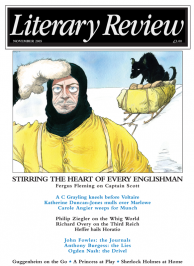John Dugdale
A Devil on the Highway
No Country for Old Men
By Cormac McCarthy
Picador 309pp 16.99
The Border Trilogy of the 1990s turned Cormac McCarthy from an obscure, reclusive author into a fêted, movie-adapted but still reclusive bestselling writer. Set in the 1940s and 1950s (although it’s forgivable to assume that All the Pretty Horses, the first and best-known novel, takes place much earlier), they essentially portray the last cowboys. In the bleak, elegiac No Country for Old Men, set in a more or less contemporary Texas, he turns his attention to another central figure of the Western, making his hero and mouthpiece one of the last old-style sheriffs.
The novel is a glorified chase thriller, which begins with Moss, a Vietnam veteran and retired welder, making a discovery. While out hunting in the Texas–Mexico borderlands, he finds three abandoned cars containing two dead bodies and a third man who’s barely alive – clearly the result of drug couriers

Sign Up to our newsletter
Receive free articles, highlights from the archive, news, details of prizes, and much more.@Lit_Review
Follow Literary Review on Twitter
Twitter Feed
In 1524, hundreds of thousands of peasants across Germany took up arms against their social superiors.
Peter Marshall investigates the causes and consequences of the German Peasants’ War, the largest uprising in Europe before the French Revolution.
Peter Marshall - Down with the Ox Tax!
Peter Marshall: Down with the Ox Tax! - Summer of Fire and Blood: The German Peasants’ War by Lyndal Roper
literaryreview.co.uk
The Soviet double agent Oleg Gordievsky, who died yesterday, reviewed many books on Russia & spying for our pages. As he lived under threat of assassination, books had to be sent to him under ever-changing pseudonyms. Here are a selection of his pieces:
Literary Review - For People Who Devour Books
Book reviews by Oleg Gordievsky
literaryreview.co.uk
The Soviet Union might seem the last place that the art duo Gilbert & George would achieve success. Yet as the communist regime collapsed, that’s precisely what happened.
@StephenSmithWDS wonders how two East End gadflies infiltrated the Eastern Bloc.
Stephen Smith - From Russia with Lucre
Stephen Smith: From Russia with Lucre - Gilbert & George and the Communists by James Birch
literaryreview.co.uk